New Trains to Replace First-Generation Fleet from 2021
The Land Transport Authority (LTA) has purchased 66 new trains[1] for the North-South and East-West Lines (NSEWL), with the option of long-term service support, worth approximately $1.2 billion from Bombardier (Singapore). These new six-car trains will replace the 66 first-generation trains that have been serving commuters since the NSEWL commenced operations in 1987.
2. The conceptual design of the trains will be done in Germany, while the design coordination will be led by Bombardier’s team based in Singapore. They will be manufactured and assembled in Bombardier’s facility in Changchun, China before arriving in batches from 2021. The trains will then undergo a rigorous testing and commissioning process before they are put into service.
Enhanced Design & Predictive Maintenance Features
3. The new trains will come with an enhanced design and new predictive maintenance features aimed at improving rail reliability on the NSEWL.
4. In line with LTA’s efforts to create a more inclusive public transport system, the interior cabins of the train are designed to include more open spaces for parents with strollers, wheelchair users and commuters carrying their personal mobility devices (PMDs). The new trains’ tip-up seats can be folded up during peak hours to create more room for passengers, without a reduction in the overall number of seats per train car (see Annex for an artist’s impression of the new train).
5. Additionally, the trains are designed to facilitate a more robust, efficient and effective predictive maintenance regime, with integrated condition-monitoring features and sensors that transmit data back to a server that can identify emerging faults for rectification before they occur. The trains are also equipped with a self-test system that automatically checks that the trains are fit for operation before daily service commences.
6. Four of the new trains will be fitted with an Automatic Track Inspection (ATI) System, which allows concurrent monitoring of the running rails, track equipment and sleepers during operations. The ATI System supplements existing track inspection activities to identify rail and trackside components that require maintenance in a more timely and efficient manner.
Long-Term Service Support
7. In addition to the new train fleet, LTA’s contract with Bombardier includes an option whereby Bombardier can provide the NSEWL’s operator with long-term service support for the new train fleet for their design life of 30 years. This means that Bombardier will be a continuous partner in the operational and maintenance aspects of the trains by providing prompt technical, logistics and inventory support for train repairs and system upgrades or replacements. Working with the NSEWL operator, this arrangement with Bombardier will further improve the availability and reliability of NSEWL trains for passenger service.
8. Said LTA’s Deputy Chief Executive for Infrastructure and Development, Mr Chua Chong Kheng: “A successful and durable rail system relies much on an efficient and assured long-term logistics and technical support network, which we are confident Bombardier will be able to provide based on their track record and close working relationship with LTA and our rail operators. The award of contract to Bombardier will revitalise our oldest rail lines and improve rail reliability, as well as Singapore’s rail capabilities.”
9. As a global train supplier, Bombardier has been active in Singapore since 1987. More recently, they supplied the 92 fully-automated and driverless trains currently serving on the Downtown Line (DTL).
10. Bombardier is also in the process of setting up a local Centre of Excellence and partnering local entities. This Centre will enable other major sub-system suppliers to be based locally to provide obsolescence and maintenance support, allowing for faster rectifications and repairs. With fleets on the DTL, Bukit Panjang LRT and now on the NSEWL, Bombardier will be able to synergise and leverage its technical expertise across all three train fleets in the future, and contribute towards raising our local rail capabilities.
Annex: Artist’s impression of the new train
[1] The cost of the 66 new trains is approximately $827 million.
















